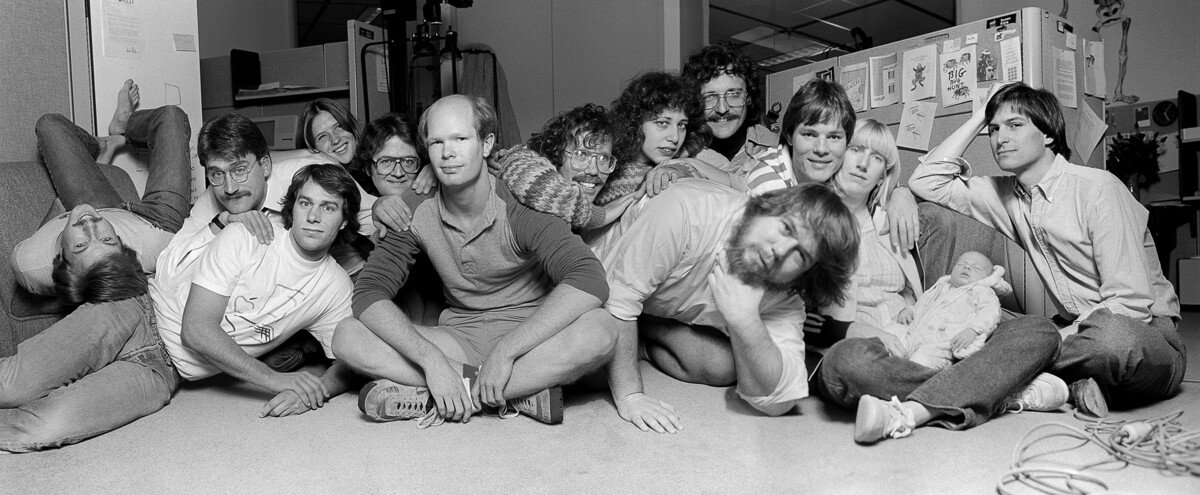I believe the average person has the aptitude to become a billionaire. We live in a dynamic world filled with dynamic people, meaning if I'm just an average person and I suddenly have the realization that becoming a farmer is my true calling, I can go about and learn everything I need to know about farming on my own, from how to genetically engineer purple watermelons, to installing an irrigation system for my beet farm.
Similarly, if your friend Sam is driving his 2003 Toyota Corolla home from his mid-level position at Deloitte to his McMansion house in suburban Chicago and suddenly realizes his true calling is becoming a billionaire, it is very possible for Sam to learn exactly what he needs to do.
On Being Lucky
In 1973, personal computers were very much not a thing. For reference, this was the year Robert Metcalfe created Ethernet at Xerox PARC (the TCP standard wouldn't even exist for another year). Yet, at Lakeside High School in Seattle, a teacher with some purchasing power realized there was enough budget left for the school to buy a computer. And even better, he believed the students should be given access to the machine with no restrictions. One of the students to use that computer would be Paul Allen, and another Bill Gates. Occasionally, people just get really lucky and have humanity's soon-to-be most useful invention freely available for tinkering at their ultra-preppy private school.
This guide assumes you didn't get as lucky as Bill Gates. (However, if you do come across a genie who offers you a magical luck-inducing potion, by all means chug it like you've never chugged before. You're going to need all the luck you can get your grubby little hands on).
The Probability of Becoming a Billionaire
What exactly are your odds of becoming a billionaire? There are 7.53 billion people in the world, and only 2,208 of them are billionaires. By pure virtue of being born, you have a 1 in 3,410,326 chance of becoming a billionaire. A one in three million chance.
Well, what if you live in the country with the most billionaires per capita — the United States? There are 327.2 million people who live in the US, and 540 of them are billionaires. If you live in the US, your billionaire odds are 1 in 605,925 — a healthy increase of 5x.
Let's take it a step further and say you went to a pretty decent college for undergrad and you had the foresight to avoid a useless major like basket weaving. I don't want to pick Harvard because that's overdone, so let's pick UC Berkeley instead. There are 425,000 living Berkeley alumni, and 25 of them are billionaires. The Berkeley billionaire odds are 1 in 17,000 — an increase of 35x compared to being a US resident. Not too shabby.
Shall we increase the odds even further? Let's say you've been accepted into Y Combinator with your fledgling startup. There are about 4,500 YC alumni, and some quick research reveals at least 15 of them are billionaires. This puts your YC billionaire odds at 1 in 300.
What if after getting into YC, you find yourself to be in the top 25% of founders? God knows by what measure, but let's just assume it for hypothetical's sake. If you're in the top 25% of YC founders, your odds of becoming a billionaire are 1 in 75 — a whopping 1.33%!
So, an average person who gets into YC and is also an exceptional founder would have increased their odds of becoming a billionaire from 1 in 3.4 million to just 1 in 75 — an increase of 45,471x.
Let's say you've gotten into YC. Well, now what? How do you become a billionaire? For starters, your startup has to be worth at least a billion dollars. Ideally 3-4x more since you'll have co-founders and investors and employees who'll also own a piece of the pie. If we use the heuristic that your startup's valuation is 10x its yearly revenue, your startup needs to make ~$400M per year. Four hundred million dollars per year. Fuck; that's a lot of money.
The only way to make $400M a year is by creating something a lot of people want.
How to Create Something People Want
Humans don't change. Us modern humans like to believe we're far more sophisticated than our cave-dwelling ancestors, however that just isn't the case. Evolution just isn't fast enough. We want the same things we've wanted for thousands of years: food, shelter, health, security, friendship, intimacy, sex, knowledge, power, respect, and freedom.
To make something people want, all you have to do is look at what humanity has been doing for ages, and then use technology to make it simpler, cheaper, and more readily available.
Travis Kalanick understood humans have wanted to go from point A to point B since the dawn of time. So he used technology to make a simple and reliable way for people to go from point A to point B. Now he's a billionaire.
Zuck understood humans have been craving friendship and belonging for thousands of years, so much so that we even feel physical pain when we're lonely. Knowing this, Zuck decided to make it possible for people to connect with each other on the internet. Now he's a billionaire. (also, did we all just forget Zuck was a psych major?!)
Sergey Brin and Larry Page both knew humans were innately curious. Neuroimaging studies even show our brain's reward center lighting up like the Forth of July when when we're curious about the answer to a question. When we can’t immediately gratify our desire to know, we become highly motivated to find an answer. And what would be a better way to acquire new information than by leveraging the rapidly growing interconnected network of computers? Surely it would be fantastic for us humans to instantly search such a wonderfully complex web of pages? Perhaps even ranked by their relevancy? If you haven't caught on by now, Larry and Sergey are both billionaires.
Here are a few more examples:
- hunting a gazelle -> Postmates, Instacart, UberEats
- watching a gladiator show at the Colosseum -> Netflix, YouTube, Twitch, Hulu
- singing hymns -> Spotify, Apple Music
- grunting at each other -> WhatsApp, Messenger, iMessage, Snapchat
- the Library of Alexandria -> Google, Wikipedia, Quora
If you can't think of how a consumer company feeds into our fundamental human desires, then it probably indirectly helps one of the above companies operate. Apple is a great example. Humans never really craved sleek slabs of glass, but your iPhone is how you access all the apps that do cater to your fundamental human needs.
To make something people want, simply take a thing people have been doing for thousands of years, and use code to make it simpler, faster, and more readily available.
This heuristic can only produce consumer startups, and the world of consumer startups can be highly irrational. So why not start a startup that sells things to the companies that serve our needs?
How to Create Something Businesses Want
Businesses are more rational than consumers. They use spreadsheets and occasionally numbers. If a business checked the weather and noticed it was chilly out, they'd put on a warm coat. If Jim noticed it was cold out, he'd be wary of wearing his coat because it might make him look fat. "What if the cute barista at Peet's saw me wearing such an unflattering coat?", asked Jim moments before the hypothermia.
As time progresses, companies will outsource everything that isn't their main value proposition. To build a successful B2B company, simply be the outsourcee.
Imagine it's 2006 and your fancy new app BookFace suddenly goes viral in Australia, and the number of incoming requests go through roof. You now have to call up some company in Palo Alto and say, "I want 10 servers with this amount of RAM and this amount of blah blah blah." They'd build those servers, and you'd go to their office, pick them up, take them to a data center, and then rack-mount them. What a drag! Wouldn't you much rather be creating a spiffy kangaroo filter for all your new Aussie users?
This is exactly what killed Friendster. Their growth was so explosive and unpredictable that servers couldn't be racked quickly enough. The site would load so slowly that users would constantly complain, eventually leaving en masse to join the much speedier Myspace.
"Why should anyone have to rack servers?", said an Amazon exec on one faithful afternoon, as a multi-billion dollar business was birthed by a single sentence. AWS is the poster-child for being the outsourcee. Why should any business have to go through the time-consuming hassle of racking servers and managing infrastructure when you could simply let Amazon do it? Surely you'd rather be coding up more features for your website instead of sitting on the floor snapping sticks of RAM into an overpriced Dell PowerEdge server.
Here are a few examples of annoying things companies had to build for themselves. That is up until a wonderful outsourcee came along, made it their sole mission to perfect said thing, and then charge everyone to use it:
- customer support -> Zendesk, Intercom, Drift
- product analytics -> Mixpanel, Segment, Google Analytics, Amplitude
- search -> Algolia
- payments -> Stripe, PayPal
- authentication -> Auth0
- error tracking -> Sentry, PagerDuty
- sales -> Salesforce, HubSpot
- email -> MailChimp, SendGrid, MailGun
Look at the things companies do. If you discover a specific thing which a lot of companies do, try to outsource it. Dedicate the next 5 years of your life to doing that one thing better than anyone in the world, and then sell it to companies.
Companies will outsource everything that isn't their main value proposition, so to build a successful B2B company, simply be the outsourcee.
Parting Thoughts
I am not a billionaire by any means, so this thesis isn't backed by experience. I've tried my best to synthesize a rationalist's path to becoming a billionaire based on things I've read and and people I've spoken to, so this guide should be taken with a grain of salt. The next 2 decades of my life will be spent implementing this guide, so I'd love to hear from you if you have ways to improve it.
Becoming a billionaire probably won't solve your unhappiness either. That's something you'll have to fix on your own. However, I do believe wealth can accelerate the realization that happiness is fundamentally intrinsic.





